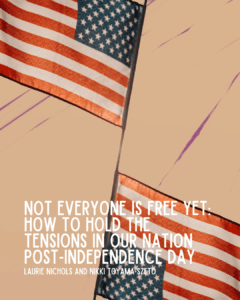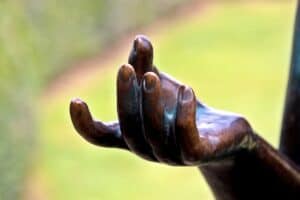 Over 200 years ago a young Francis Scott Key would pen the lyrics to the song that would become the national anthem of the United States 30 years later. This Independence Day, like so many others, millions of people waved their flags and sang loud and proud the final line of what is today “The Star-Spangled Banner”: “O say does that star-spangled banner yet wave; O’er the land of the free and the home of the brave!”
Over 200 years ago a young Francis Scott Key would pen the lyrics to the song that would become the national anthem of the United States 30 years later. This Independence Day, like so many others, millions of people waved their flags and sang loud and proud the final line of what is today “The Star-Spangled Banner”: “O say does that star-spangled banner yet wave; O’er the land of the free and the home of the brave!”
While many in our nation tear up at this American ideal of freedom for all, even during Key’s time, abolitionists ridiculed his words, saying America was more like the “Land of the Free and Home of the Oppressed.”
Key was a slave owner. But he was also opposed to slavery. So too with Thomas Jefferson, who both drafted the Declaration of Independence that would declare the “self-evident” truth that “all men are created equal” and who also owned dozens and dozens of slaves.
The tension of freedom in this nation has always existed. Who is free, and how do we know they are free? At some points, the lack of freedoms has been clear: poll taxes, voting rights, marriage equality, school segregation. At other points, the water has muddied. But never have all been free.
Although many of us have memorized the popular first stanza of our national anthem, an equal number may not be as familiar with the final verses of the fourth and last stanza: “Then conquer we must, when our cause it is just, And this be our motto – “In God is our trust,” And the star-spangled banner in triumph shall wave, O’er the land of the free and the home of the brave.”
The song is birthed in violence and war. The very notion of freedom here emerged from a time of suffering, and one whose lines of right and wrong and good and bad were blurred by worldview and privilege. The War of 1812 was raging on, but the United States was seeing victories. Victories over Great Britain, but at the same time “victories” over those native to this land.
For many of us fighting against injustice, we see Key as nothing but a slaveholder. We fight long and hard for the wrongs we want to see made right. Some of us didn’t sing our national anthem. Some didn’t even raise our flag.
We are weary. We want to believe in good and live in a place of joy, but everywhere we look it seems that justice is but a tiny dot in the distance. Rosa Parks eloquently said it this way: “There is just so much hurt, disappointment, and oppression one can take….The line between reason and madness grows thinner.”
But as those who believe in a God of both love and justice, we stand in a long line of followers of Christ who are called to hold two tensions in our hands—to see the goodness of God around us and to call out the moments when this goodness is being smothered and when others hinder the efforts of love and justice for all.
As followers of Christ, we must begin to hold the tension of both celebration of what God has done and lament and longing for what still needs to be done. One does not eradicate the other. Both must be embraced and honored.
This begins with an accurate understanding of freedom. Freedom began with sacrifice from another. Most poignantly and importantly, the freedom we have to find reconciliation with God and to dwell securely in His arms wasn’t freedom as we know it when Christ Jesus hung on that cross 2,000 years ago.
Indeed, He could have walked away at any moment. He was God.
But for our freedom He didn’t turn His back. He wept and sweat tears and blood. He cried out.
And then he freely sacrificed Himself so that we could be free.
What kind of freedom is this?
It is a freedom not of self. We don’t seek our own needs and desires. We don’t get up off that dirty and dusty garden floor and walk away. Instead, we get up and starting walking in the direction of others as we hold the tensions together.
For those of us in positions of privilege, our freedom expression must lean more heavily into lament of a society that hasn’t allowed all to be free to be who they are and reach the potential given to them by God. For those of us in positions of marginalization, our freedom expression must lean more heavily into celebration of the good things God has done. Where can we find places of wonder as we look at our history and our relationships that will fuel us for today and the days ahead?
Hebrews 12:1-3 is our guide:
Therefore, since we are surrounded by such a great cloud of witnesses, let us throw off everything that hinders and the sin that so easily entangles. And let us run with perseverance the race marked out for us, fixing our eyes on Jesus, the pioneer and perfecter of faith. For the joy set before him he endured the cross, scorning its shame, and sat down at the right hand of the throne of God. Consider him who endured such opposition from sinners, so that you will not grow weary and lose heart. (NIV)
The imagery of freedom here is this: “For the joy set before him he endured the cross, scorning the shame…” Jesus’ sacrifice was a freedom for those who could not help themselves. He used his freedom to both celebrate the Father’s plan of reconciliation and also do what only He could do to help us—the poor, the broken, the weak, the dependent.
As Christ’s church, we now have that freedom to both celebrate all God is doing and to work in places where His plan of justice and love are not yet accomplished. We cannot have one without the other. Not everyone is free yet. Yet.
Laurie Nichols is Content Editor for Christians for Social Action and Founder of the Heromakers Movement and Common Good Communications, where she seeks to help nonprofit organizations and individuals to create resources and messaging that will better our world. Nikki Toyama-Szeto is Executive Director of Christians for Social Action. She writes on justice, leadership, gender issues, and racial justice for various media outlets.


